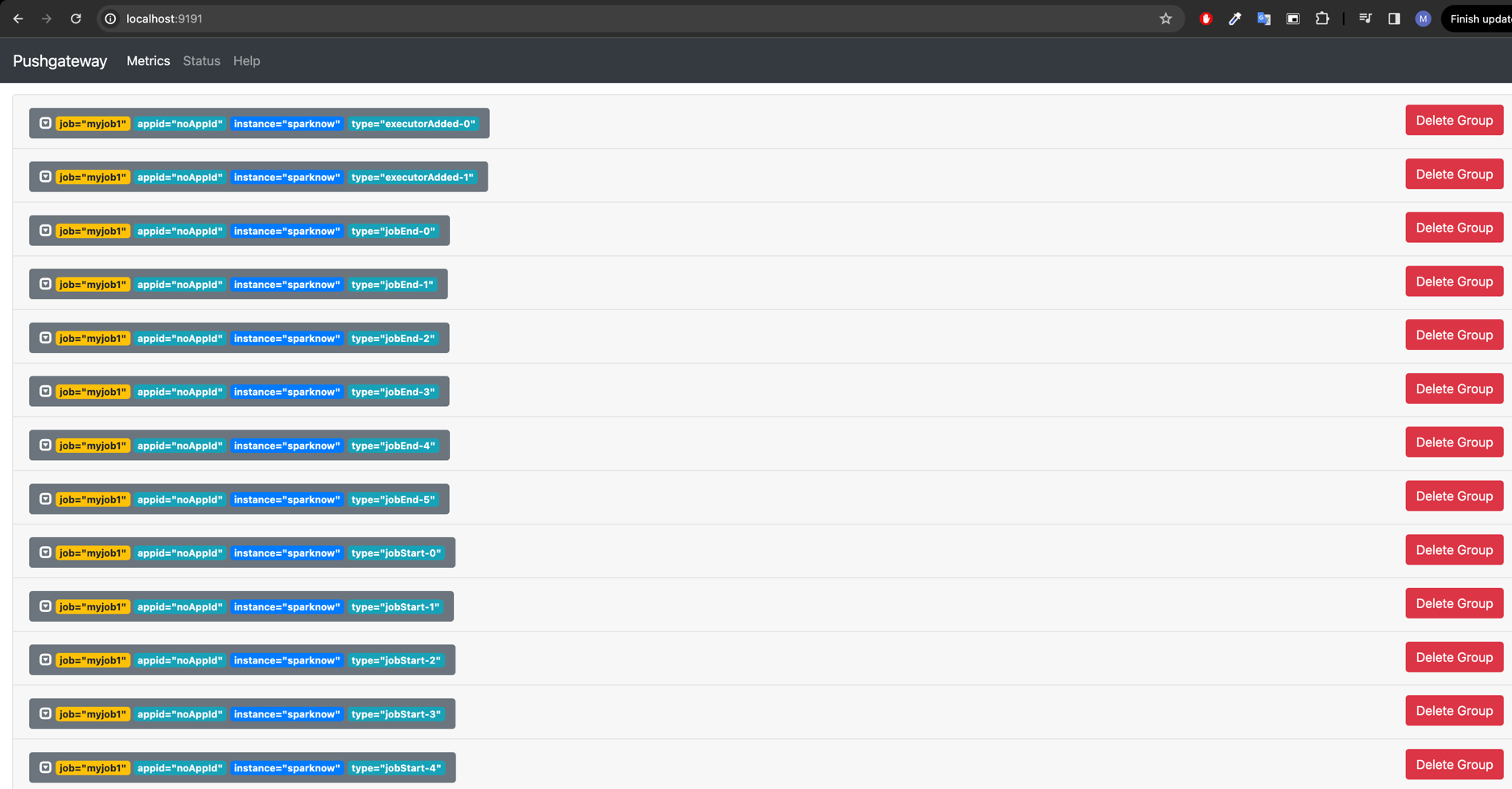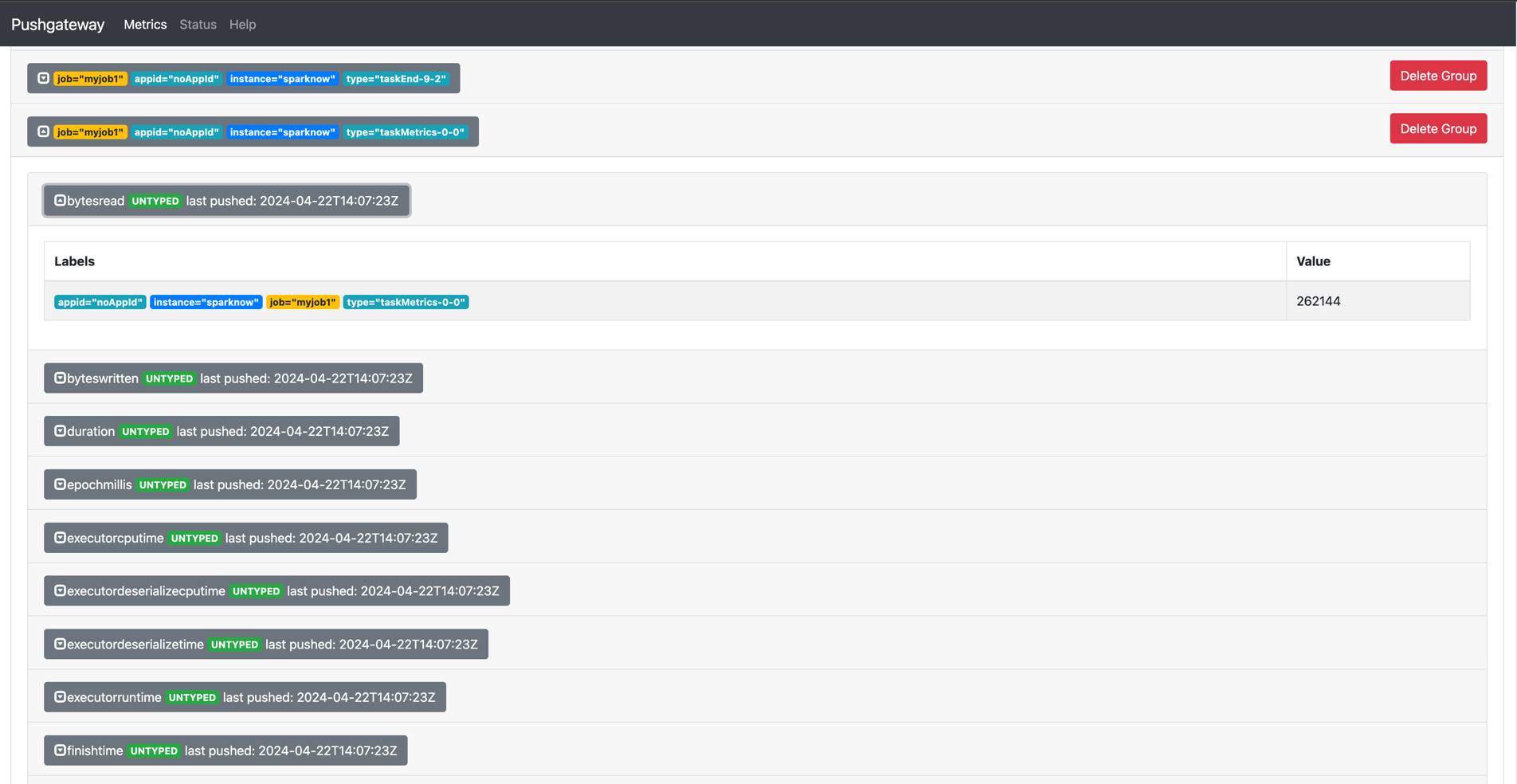The Sparknow plugin is a Scala application that uses Spark listeners to collect metrics from key Spark methods and send them to the Prometheus Pushgateway o a Kafka Topic for monitoring the performance of Spark jobs.
The project consists of two modules, sink and spark-job, the former is the actual plugin that collects the metrics, the latter is a very simple example spark job that performs a word count of a book, it was added for testing and experimentation purposes only.
Plugin has been tested with spark versions 3.3.1 through 3.5.1
The following methods are the ones that are tapped to collect metrics, for the full list of values that are collected for each action see the code directly
- onTaskStart (only if extended mode is enabled).
- onTaskEnd (only if extended mode is enabled).
- onStageSubmitted
- onStageCompleted
- onExecutorExcluded
- onExecutorAdded
- onExecutorRemoved
- onOtherEvent
- onJobStart
- onJobEnd
| Property Name | Default | Meaning |
|---|---|---|
| spark.sparknow.jobname | no-job-name | Use this parameter to set the job name |
| spark.sparknow.extendedmode | false | Use this parameter to set the plugin to "extended" mode. extended mode also collects metrics at the task level, beware it may cause a large amount of data on the network. |
| spark.sparknow.pushgateway | None | Use this parameter to set address and port to connect to the pushgateway. |
| spark.sparknow.kafkaBroker | None | Use this parameter to set the address(es) of the Kafka brokers. |
| spark.sparknow.kafkaTopic | None | Use this parameter to set the target topic kafka metrics. |
A simple spark standalone cluster for your testing environment purposes. A docker-compose up away from you solution for your spark development environment.
The Docker compose will create the following containers:
| container | exposed ports |
|---|---|
| spark-master | 9090 7077 |
| spark-worker-1 | 9091 |
| spark-worker-2 | 9092 |
| pushgateway | 9191 |
| prometheus | 9090 |
| grafana | 3000 |
The following steps will make you run your spark cluster's containers.
- Docker installed
- Docker compose installed
cd sink
sbt assembly
copy the .jar file created in target folder to infrastructure/spark/jars
cd spark-job
sbt assembly
copy the .jar file created in target folder to infrastructure/spark/jars
cd infrastructure/spark/docker/
./build-images.sh
docker-compose up -d
Once the docker compose is started, to submit the app connect to one of the workers or the master and execute:
docker exec -it spark-master /bin/bash/spark/bin/spark-submit --master spark://spark-master:7077 \
--driver-memory 1G \
--executor-memory 1G \
--conf spark.app.id=word-count-job \
--conf spark.driver.extraClassPath=/opt/spark-apps/sink-assembly-0.1.0-SNAPSHOT.jar \
--conf spark.extraListeners=com.afjcjsbx.sparknow.PushGatewaySink \
--conf spark.sparknow.pushgateway=pushgateway:9191 \
--conf spark.sparknow.jobname=myjob1 \
--conf spark.sparknow.extendedmode=true \
/opt/spark-apps/spark-job-assembly-0.1.0-SNAPSHOT.jarIf you have chosen to use PushGatewaySink rather than KafkaSink the metrics collected will be sent to the PushGateway via an Http POST request, you can check the metrics invited in realtime by accessing localhost:9191 (if you have not changed the port in the compose docker).
you can explode the aggregate metrics to see the values
- Implement more Sink to send metrics to new systems



